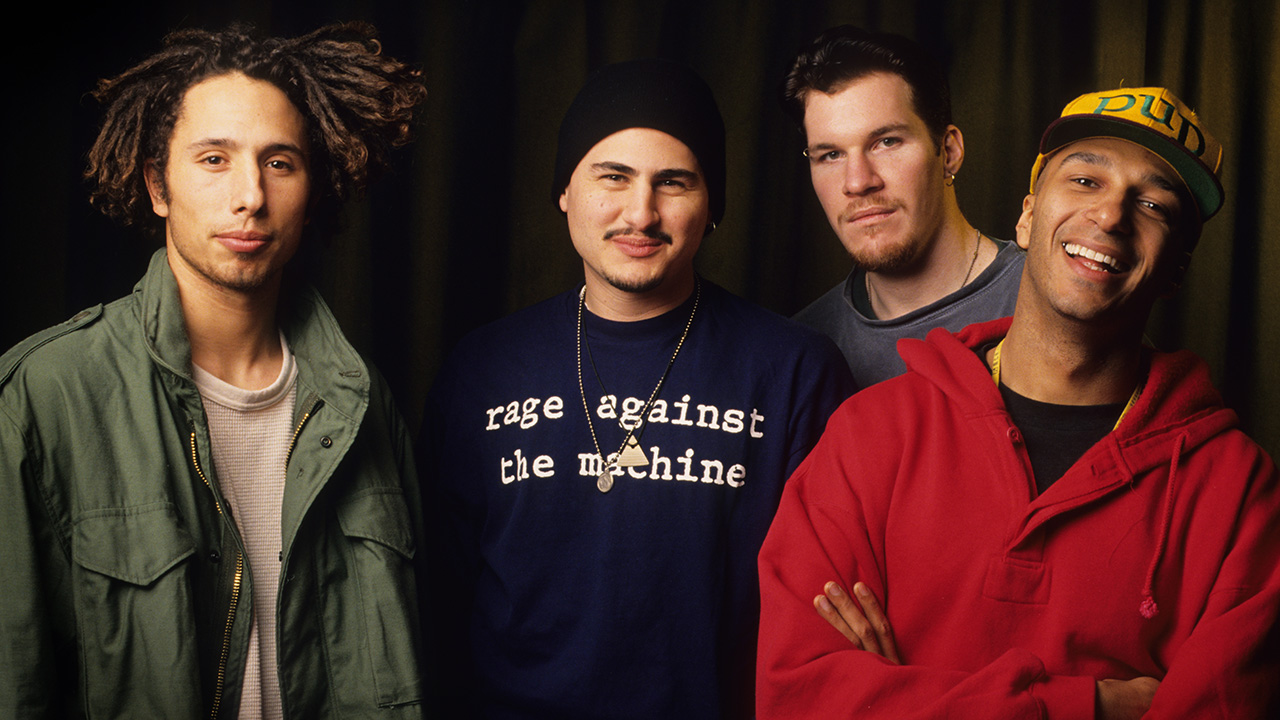Story Behind the Song: Killing In The Name by Rage Against The Machine
Inspired by the LA riots, Killing In The Name became an unlikely Christmas number one 17 years after its release

Select the newsletters you’d like to receive. Then, add your email to sign up.
You are now subscribed
Your newsletter sign-up was successful
Want to add more newsletters?

Every Friday
Louder
Louder’s weekly newsletter is jam-packed with the team’s personal highlights from the last seven days, including features, breaking news, reviews and tons of juicy exclusives from the world of alternative music.

Every Friday
Classic Rock
The Classic Rock newsletter is an essential read for the discerning rock fan. Every week we bring you the news, reviews and the very best features and interviews from our extensive archive. Written by rock fans for rock fans.

Every Friday
Metal Hammer
For the last four decades Metal Hammer has been the world’s greatest metal magazine. Created by metalheads for metalheads, ‘Hammer takes you behind the scenes, closer to the action, and nearer to the bands that you love the most.

Every Friday
Prog
The Prog newsletter brings you the very best of Prog Magazine and our website, every Friday. We'll deliver you the very latest news from the Prog universe, informative features and archive material from Prog’s impressive vault.
Few rock songs have enjoyed an afterlife quite like Rage Against The Machine's Killing In The Name did. Its adoption by a Facebook campaign in December 2009, intended to put the blocks on X Factor winner Joe McElderry claiming that year’s Christmas No.1 spot, was a phenomenal success. Killing... raced to the top by racking up more than half a million downloads, leaving McElderry behind and becoming the fastest-selling digital single ever.
The feat was all the more remarkable given that the track was 17 years old and peppered with potty-mouthed expletives – and the fact that Rage Against The Machine, who recorded it, had little to do with this second coming
“It took us completely by surprise,” admits guitarist Tom Morello. “It was a tremendous David and Goliath story. We only joined the campaign in the final week. It was completely ruled by the fans, and was one of the greatest things in my life.”
Killing In The Name was riven with meaning, written at a key moment in recent American history. The beating of black motorist Rodney King by four LAPD officers in March 1991, captured on CCTV footage, had enraged the nation after it was serially beamed across every news channel.
It was an episode that fed directly into the wiring of Rage Against The Machine, a radical bunch of rap metal-heads who railed against all manner of societal and political ills. Formed in Orange County, California that year, they were led by singer Zack de la Rocha, son of a Chicano political artist and grandson of a Mexican revolutionary, and Morello, himself the scion of African insurrectionists.
The track, Rage Against The Machine’s first single, bit hard on several levels. A righteous slam-bam of punk, hardcore and hip-hop, Killing In The Name was heavy on venomous polemic, burning its gaze into what the band saw as endemic racism in US security agencies. De la Rocha’s repeated mantra ‘Some of those that work forces are the same that burn crosses’ alludes directly to the Ku Klux Klan.
“I was in LA when the whole Rodney King episode went down,” explains Garth Richardson, producer of the song and 1992’s self-titled parent album. “That was a big thing for the city. Zack and I had a long talk about the power of speech and how whatever he needed to say, he had to say it. Malcolm X was a major influence in Zack’s life, and this was not the time to back down.”
Sign up below to get the latest from Classic Rock, plus exclusive special offers, direct to your inbox!
The track’s slamming guitar motif, which echoed the no-compromise ferocity of its message, was more serendipitous.
“I was actually in the middle of playing bass in a guitar lesson,” Morello recalls, “and was teaching a student about the drop-D tuning when it came to me. I said to him: ‘Hold on one second’, and scribbled it down. Then we went into rehearsals that night and worked it out. It was part of the second wave of songs we ever wrote.”
Killing In The Name is particularly notorious for its final verse, in which de la Rocha, having built to something of a belligerent frenzy, hollers: ‘Fuck you! I won’t do what you tell me!’ no less than 16 times, topped off by: ‘Motherfucker! Uggh!’ It’s an extraordinary climax, made all the more primal by Richardson setting up the studio with a concert PA and recording the band as if it were a live show.
“My jaw hit the floor,” he recalls. “The song was a standout for an anthem and it knocked me off my feet. We all felt this was going to be big. I knew that Tom’s sound was going to change the way guitars were being heard.”
"Zack and I had a long talk about the power of speech and how whatever he needed to say, he had to say it. Malcolm X was a major influence in Zack’s life, and this was not the time to back down."
Garth Richardson, producer
However, the band did not instantly earmark it as a single.
“Heavens no!” Morello laughs. “We had a particular guy at the record company, Michael Goldstone, who was very sympathetic to what we were trying to say as a band. He was our ‘fifth Beatle’ for a while and very much high in our counsel. It was his suggestion that we release it as our first single.
"It didn’t come from the band. So it was a case of, ‘Okay, let’s get this straight: it’s the record company who want our first record to be the one that goes, “Fuck you! I won’t do what you tell me!” 16 times, followed by a “motherfucker”?’ Sold! That wouldn’t have been my choice, but that’s how it worked.”
Goldstone may have been adamant about its release, but he nevertheless felt the track was too long. He asked Rage to remove two sections, but the band were having none of it.
“Michael called me, and I was the go-between with the band,” Richardson says. “It went like this. Michael: ‘I want you to cut out those parts’. The band: ‘Tell him to fuck off’. Michael: ‘Tell them to fuck off’. Band: ‘Fuck you’. We all knew this song was a huge hit. It had so much power that the band and I were unwilling to let anybody change it.”
It drew even more potency by the time it was released on the album, in November 92. Rodney King’s police assailants had somehow been acquitted by a jury in court that April, a barely believable verdict that instantly triggered the LA riots. The whole affair did little to dispel the song’s claims of institutional racism in certain sections of American society.
Killing In The Name, unsurprisingly enough, was slapped with a radio ban across most US stations. The unedited video version was also censored on MTV.
It was instead left to Europe to carry the flag, where the song enjoyed substantial airplay (albeit in ‘clean’ form, apart from one priceless moment when Radio 1 jock Bruno Brookes unwittingly played the original version in full on his Top 40 run-down) and made No.2. in the UK in February 93.
Bullet In The Head and Bulls On Parade were bigger UK hits for Rage in the 90s, but Killing In The Name remains their signifier.
“Having a UK Christmas number one in 2009, after all that time was a thrill of a lifetime,” says Richardson. “It just shows how much power people have and what they can do when they work as a group.
"This band is like no other, what they stand for and what they’ve done. I don’t think anyone will be able to copy them. They changed the musical landscape forever.”
Freelance writer for Classic Rock since 2008, and sister title Prog since its inception in 2009. Regular contributor to Uncut magazine for over 20 years. Other clients include Word magazine, Record Collector, The Guardian, Sunday Times, The Telegraph and When Saturday Comes. Alongside Marc Riley, co-presenter of long-running A-Z Of David Bowie podcast. Also appears twice a week on Riley’s BBC6 radio show, rifling through old copies of the NME and Melody Maker in the Parallel Universe slot. Designed Aston Villa’s kit during a previous life as a sportswear designer. Geezer Butler told him he loved the all-black away strip.

